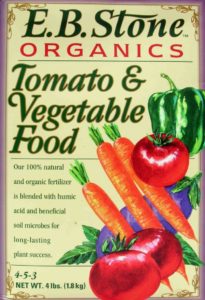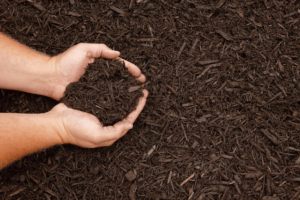By now we hope you are enjoying some of the “fruits” in the form of vegetables from your summer vegetable garden labors. We are so lucky to have a long growing season and look forward to enjoying these vegetables for another few months. Many will produce into October!
There are some things you can do to be more successful. Let’s take a look.
Apply fertilizer monthly. We recommend Master’s Tomato & Vegetable Food or E.B. Stone Organic Tomato & Vegetable Food. Don’t fertilize a thirsty plant — water your garden thoroughly at least 4 hours before feeding. Apply fertilizer and water again. During the summer it is important to be strategic when you fertilize. Try to do it on days where the temperatures are not expected to be above 85 or 90 degrees. You don’t want the fertilizer to burn your plants.
Mulch to conserve moisture, control weeds, and protect your plants from heat — 2 to 3 inches of mulch applied over the roots of your vegetable plants will cool the soil, reduce weeds, and help prevent soil moisture and temperature fluctuations that stress your plants. Just keep the mulch about 6″ away from the crown or base of the plants.
Train cucumbers, squash and pole beans to climb trellises or poles to save space.
Control garden pests before they control you! Snails and slugs are out in force, as well as earwigs, cutworms, whiteflies, and tomato horn worms — Come in for the best non-toxic control around vegetables.
Take a few minutes every day or so to examine your garden for potential problems before they get out of hand — prevention is always best; fast, easy and less expensive than the cure.
Special watering tips:
Water consistently. Water deeply, then give the soil time to dry partially before watering again. This is probably the most important step to a successful vegetable garden. Manage soil moisture so plants do not completely dry out, but are not over-watered.
Water by the weather. When we get a hot streak your vegetables are going to be more “thirsty” just like you are! When we are fortunate to enjoy moderate temperatures, your plants will not take up as much water.
Inconsistent watering creates unnecessary stress and reduces yields in most vegetables, and/or makes others, like cucumbers and lettuce, taste bitter. One of the best ways to water a vegetable garden is to test soil with a moisture meter just before a scheduled watering to confirm the water is actually needed, and also the day after a watering to confirm the watering was adequate – this reduces both excess water use and also the chance of error while reducing stress on you! When you use a moisture meter probe in only about an inch.
Not all vegetables should be watered alike — learn the proper watering for your particular vegetables. For example, established tomato plants should be watered deeply and less frequently. These plants have deep roots and frequent watering encourages plant growth without much fruit production. Cucumbers on the other hand need to be kept evenly moist to help prevent them from being bitter.
Follow us in Social Media